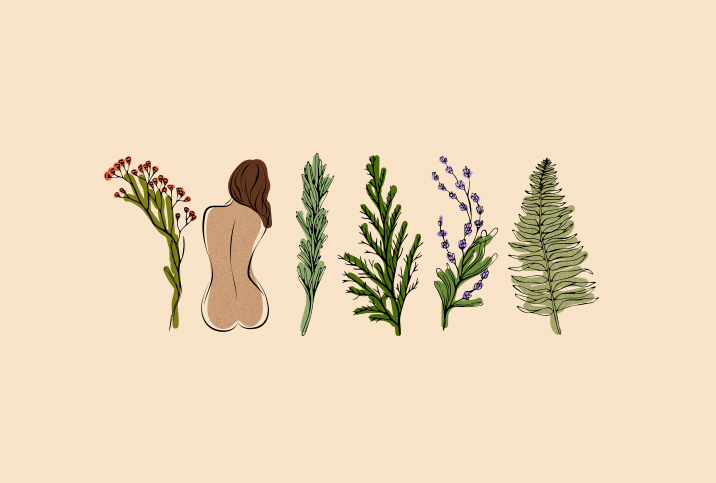Herbal Abortions Are Dangerous—Let's Talk Safe Alternatives

It's no surprise that information about self-induced, or do-it-yourself (DIY), abortions is circulating in response to the possible upcoming fall of Roe v. Wade, the landmark case that legalized abortion in the United States 49 years ago.
A quick scroll plugging in the term "herbal abortion" on TikTok reveals endless shorts of budding herbalists listing names of herbs that can cause abortions. Many of these videos do not list toxicity levels, potentially dangerous side effects or the fact that some of these herbs can cause severe organ damage or even death to the pregnant person.
The danger of herbal abortions
An abortifacient is any substance used to terminate a pregnancy. Common abortifacient herbs mentioned on social media include mugwort, pennyroyal, Queen Anne's lace, cotton root bark, parsley inserted in the vagina and high doses of vitamin C, to name a few. Pennyroyal is extremely toxic and has been linked to several instances of liver injury and death.
"On TikTok, I commonly see suggestions of vitamin C and ibuprofen, which definitely will not work, and that this content goes viral keeps me up many nights," said Jennifer Lincoln, M.D., an OB-GYN in Portland, Oregon.
There is very little research on the safety or efficacy of herbal abortifacients.
"Herbal abortifacients typically work by stimulating contractions of the uterus or by being directly toxic to cells, like the placenta and fetus. Some of these chemicals can damage the heart, kidneys or liver. Most of these products are understudied, so the risk isn't really known," stated Jen Gunter, M.D., a San Francisco-based OB-GYN and the best-selling author of "The Vagina Bible," on her website.
Due to the limited data, scientists have concluded that herbs to induce abortion involves the risk of morbidity and mortality of the pregnant person, according to a 2003 article published in the medical journal Clinical Toxicology.
Researchers looked at 86 cases of attempted self-induced abortion involving 30 different plant species and found that although abortion occurred in 23 cases, multiple organ system failure occurred in the pregnant people who ingested ruda, Carachipita (which contains pennyroyal), arnica and bardana. Death occurred in five cases, one from Carachipita and four from ruda.
"Certainly, we recommend against any attempts to use herbs to efface an abortion," stated the American College of Obstetricians and Gynecologists (ACOG) in a request for comment.
Unsafe abortion is one of the leading causes of maternal mortality, according to the World Health Organization (WHO). Unsafe abortion is defined as a procedure to terminate a pregnancy that is performed by people who lack the necessary skills or in an environment that does not meet minimum medical standards.
"The bottom line is that they [herbal abortifacients] are obviously unregulated and do not work at the same rate as traditional abortifacients, and because of that, should be avoided," Lincoln stated. "They can have severe side effects like organ failure and death."
Herbal abortifacients don't always work
In addition to dangerous and deadly side effects, herbal abortifacients also pose a higher risk of not working and the pregnancy continuing, because the data on dosage and efficacy is unknown.
"This can be distressing for obvious reasons but more so if there is some bleeding and a person thinks their abortion was successful, only to find out later on that they are still pregnant and now farther along," Lincoln explained.
New state abortion restrictions further compound barriers, such as traveling across state lines, affording care and taking time off work, to obtaining an abortion.
If a self-induced abortion is unsuccessful, there are obvious consequences.
"[The person] may need to pursue a surgical abortion as a result, which, while extremely safe, gets more challenging in terms of access and risks the farther along the pregnancy is," Lincoln said. "They also become more expensive."
Safe alternatives to DIY abortions
While the herbal abortifacient information circulating online may seem accessible, it is not as effective or safe as medication abortion.
"I would recommend against herbal abortifacients because this is not the time to DIY a solution, especially when safe alternatives exist," Lincoln said.
Abortion via the medications mifepristone and misoprostol accounted for over half of all abortions in 2020 in the United States, according to research from the Guttmacher Institute, a research and policy organization on sexual and reproductive health topics.
Medication abortion is approved for up to 10 weeks gestation in the U.S., though the WHO considers this method safe for up to 12 weeks. Research indicates that medication abortion has a 95 percent efficacy rate and an extremely low risk of complications.
Due to the limited data, scientists have concluded that herbs to induce abortion involves the risk of morbidity and mortality of the pregnant person.
Lincoln pointed out that although state laws and new restrictions make access to medication abortion more difficult in some areas of the country, Aid Access, an international abortion rights organization, ships medication abortion to all 50 states. Despite demands from some U.S. politicians to stop, the group is continuing to provide abortion medication by mail to every state.
"It is so important to not fall back on pills bought from questionable sources or DIY methods," Lincoln stressed. For people facing financial barriers, abortion funds can help provide assistance.
"The current evidence shows that most people are able to safely and effectively manage their abortions using mifepristone and misoprostol when they acquire these medications from reliable sources. Medication abortion is an extremely safe medical intervention," said Nisha Verma, M.D., M.P.H., a Washington, D.C.-based OB-GYN with a specialty in complex family planning, and the Darney-Landy ACOG fellow.
"Evidence also indicates that people can safely carry out a medication abortion without direct doctor supervision when they have access to accurate information, reliable medications and support if a rare complication arises," Verma said.
The reason we don't have trials examining the safety of herbal abortions versus medication abortion is "because that would be unethical to do when we know how safe and effective medication abortion is," Lincoln added.
In 1965, less than a decade before Roe v. Wade's passing, illegal abortion accounted for 17 percent of all deaths attributed to pregnancy and childbirth that year, a number that is likely much higher than its estimate.
Fortunately, today, a safe and effective alternative exists in the form of medication abortion.
Abortion is a medical procedure that is currently illegal or restricted in some portions of the United States. For more information about the legality of abortion in your area, please consult a local healthcare provider.




















